Review New Range Rover Sport 2023 review UK
Kinh Nghiệm về New Range Rover Sport 2023 review UK Mới Nhất
Lê Hải Hưng đang tìm kiếm từ khóa New Range Rover Sport 2023 review UK được Update vào lúc : 2022-11-18 09:22:04 . Với phương châm chia sẻ Bí quyết về trong nội dung bài viết một cách Chi Tiết 2022. Nếu sau khi đọc nội dung bài viết vẫn ko hiểu thì hoàn toàn có thể lại Comments ở cuối bài để Ad lý giải và hướng dẫn lại nha.
Reviews
Nội dung chính Show- The new Range Rover Sport pushes even further into sleek road-focused territory, with big leaps in space and tech. The steering, however...Things we likeNot so muchRange Rover Sport. The contradiction is right there in the name. Powertrains and pricesOn the roadWe sampled the SE D300, Dynamic SE P400, a First Edition P530 and an Autobiography P510e on the drive program in Spain.What makes the P510e appealing is its ability to deliver near-V8 performance or better than six-cylinder fuel economy, depending on your mood.Things we likeNot so muchWhat is the difference between 2022 and 2023 Range Rover?Will the 2023 Range Rover Sport be redesigned?Will the Range Rover change in 2023?What will the 2023 Range Rover Sport cost?
The new Range Rover Sport pushes even further into sleek road-focused territory, with big leaps in space and tech. The steering, however...
15 Sep 2022

8.5
Safety, value and features
Things we like
- Sophisticated designQuiet cabin and comfortable primary rideStill a benchmark in terms of combined on- and off-road capability
Not so much
- Heavy on-centre steering feelV8 seems lazyImpact harshness from 23-inch wheel/tyre combo
Range Rover Sport. The contradiction is right there in the name.
Trying to make an SUV drive like a sporty sedan, much less a sports car, is a tough task. Ask the engineers Porsche who work on the Cayenne. But when your brand is famous for building the world’s plushest, most luxurious, yet impressively off-road capable SUVs on the planet, that takes the challenge to a whole new level.
Yet Land Rover seems to have cracked the code. It has sold more than one million Range Rover Sports since the first-gen model hit the road in 2004. The all-new, third-gen Range Rover Sport thus has big shoes to fill, and big bucks to earn for Jaguar Land Rover. That’s why the new Sport has been developed pretty much alongside the new full-sized Range Rover and shares the bigger car’s aluminium intensive MLA-Flex vehicle architecture and powertrain components.
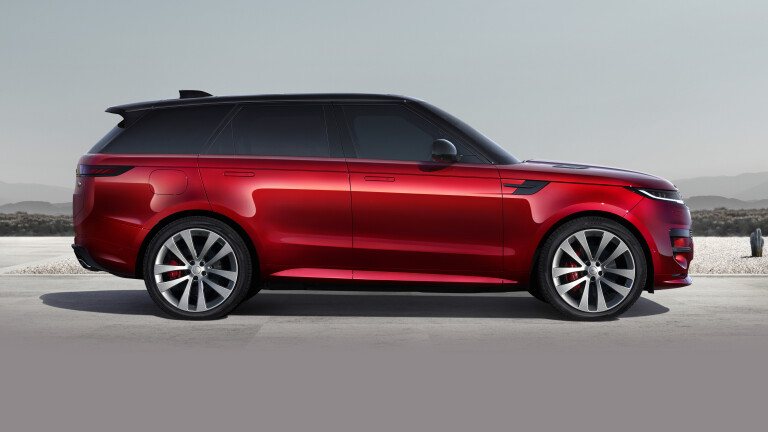
Visually, the new Sport’s basic proportion and stance are very similar to that of the outgoing model, more than 800,000 of which have been sold since 2013, but the all-new sheet metal is smoother and cleaner, the result of JLR chief creative officer Gerry McGovern’s obsession with reductionist design.
The front end features a narrower grille framed by narrower headlights, and a fascia that wraps smoothly around to the body toàn thân sides. As with the new Range Rover, the tops of the doors roll over to meet the flush side glass without a visible seam or rubber seal and the D-pillar is hidden under glass.
At the rear are new horizontal format LED taillights linked by black panel. The number plate has been repositioned from the tail gate to the bumper.
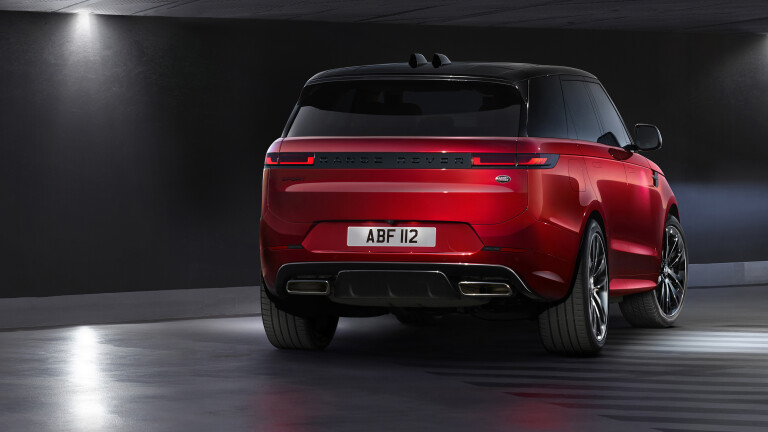
Inside is an interior designed to deliver a sportier, more driver-focused ambience than the ultra-lux vibe of the big Range Rover. The steering wheel has three spokes and is of a slightly smaller diameter than the Range Rover wheel. The high centre console puts the transmission shifter and various minor controls within easy reach.
At the centre of the dash is a curved 13.1-inch haptic response touch screen to control the Pivi Pro infotainment system. Among the apps the system can run is Amazon’s Alexa, and with its 12 ultrasonic sensors and four cameras, the system will allow the Range Rover Sport to park itself.
JLR’s 3.0-litre Ingenium turbocharged straight-six petrol and diesel engines with the 48V mild hybrid (MHEV) system will be the volume-selling powertrains in the Sport.
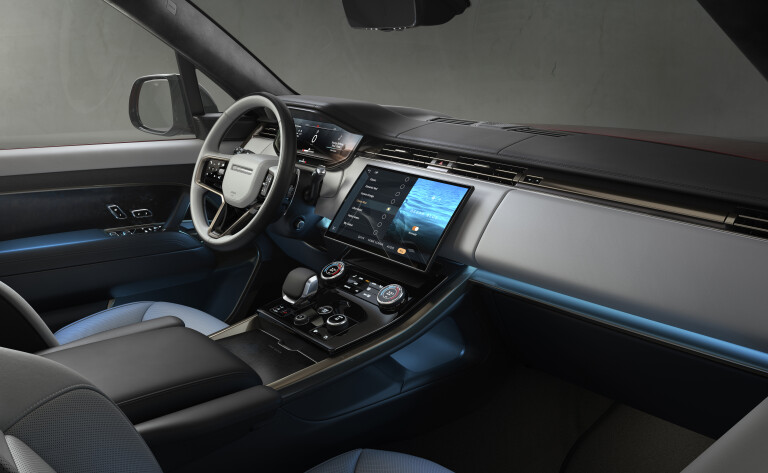
Powertrains and prices
In Australia the diesel Ingenium will be available in three specifications – 183kW/600Nm D250, 221kW/650Nm D300, and the 258kW/700Nm D350.
The D250 will only be available on the entry-level, $139,160 SE, and the D300 only on the next model up the ladder, the $151,026 Dynamic SE.
The D350 is available in the $168,638 Dynamic HSE and the $191,141 top-of-the-range Autobiography, as well as in the $196,359 First Edition.
In terms of petrol Ingeniums, the P360 version with 265kW and 500Nm is available in the SE, priced from $144,788, while the 294kW, 550Nm P400 can be ordered in the Dynamic SE and Dynamic HSE, priced from $155,608 and $167,547, respectively.
Top petrol engine is a BMW-sourced 4.4-litre twin-turbo V8, badged P530, that produces 390kW and 750Nm. It can be had in the Dynamic HSE for $197,809, and the Autobiography for $220,312. Neither will be available in the 2023 model year, however.
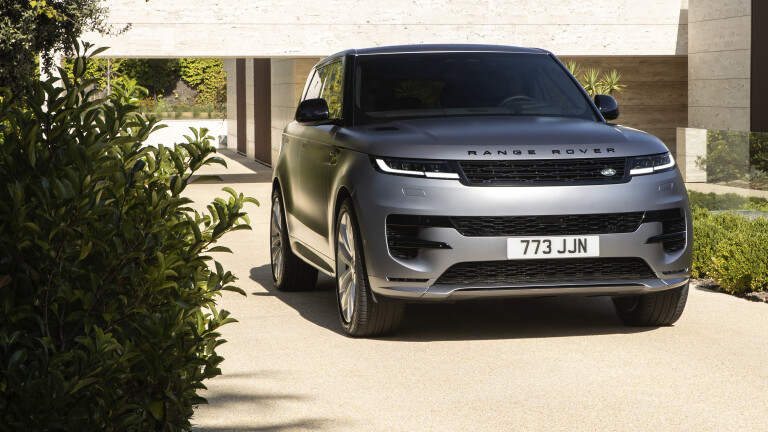
If you’re desperate for a V8-powered Sport, you’ll have to opt for one of 30 identically specified P530 First Edition models JLR Australia has secured for the 2023 model year. All will be finished in Santorini black, with black wheels and a black interior, and priced $241,021. (All prices without on-road costs.)
The most interesting powertrain is plug-in hybrid P510e, which will be available only in the Dynamic HSE, and priced $198,097.
It combines the 294kW petrol Ingenium straight-six with a 105kW e-motor to deliver a total system output of 375kW and 700Nm. The e-motor is fed by a 38.2kWh battery that delivers a 113km pure electric driving range according to the WLTP and helps achieve a total real world driving range of 740km.
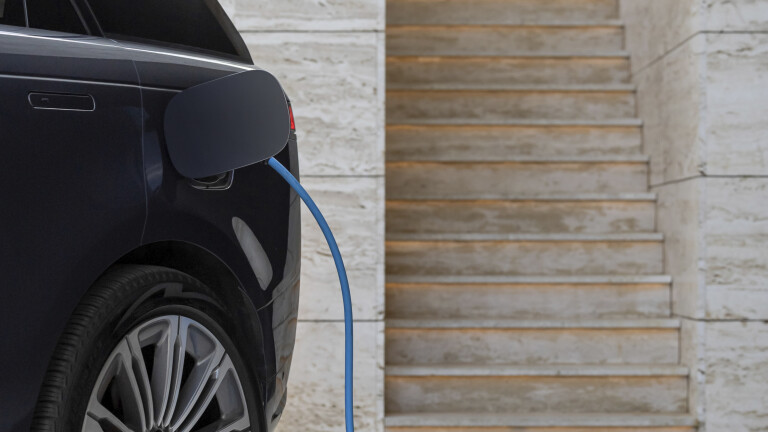
On the road
We sampled the SE D300, Dynamic SE P400, a First Edition P530 and an Autobiography P510e on the drive program in Spain.
All were highly specified, with the SE D300 and Dynamic SE P400 equipped with the optional Stormer Handling Pack that included the rear-wheel steering and the active electronic differential with torque vectoring by braking – among other things – which are standard on the Autobiography and First Edition. All cars rolled on 23-inch wheels shod with 285/40 Pirelli Scorpion Zero tyres.
Quick takes: The D300 is a very good diesel, punchy in the low- to mid-range, and willing to spin smoothly all the way to the soft limiter 4750rpm with a barrel-chested murmur. JLR claims it delivers a 0-100km/h acceleration time of 6.6 seconds for the Sport SE and from 7.9L/100km on the WLTP combined fuel consumption test.
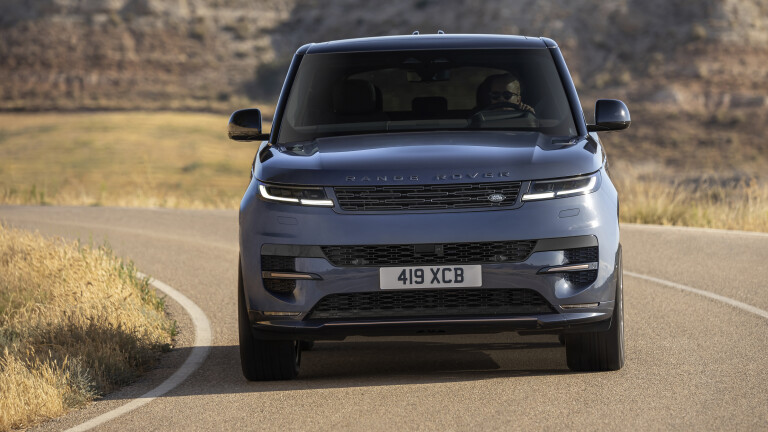
The P530 is a disappointment. In the Sport First Edition the twin-turbo V8 might be good for 0-100km/h in 4.5 seconds, according to JLR’s figures, but it doesn’t feel that fast. You never sense it’s giving you 390kW or 750Nm, especially in the mid-range, where it doesn’t have the same immediacy of the previous model’s 5.0-litre supercharged engine.
The P400 is a pleasant surprise. It doesn’t have the outright urge of the P530, taking 5.7 seconds to get the Sport Dynamic SE to 100km/h, but in real-world driving conditions, this smooth petrol straight six delivers more than enough performance to leave you wondering whether you’d really want to spend 30 grand more for a Dynamic SE with the V8.
Especially as the P400’s WLTP combined fuel economy number of 9.4L/100km is 20 percent better than the V8’s.
The P400 is the value powertrain, but the P510e, which in the Dynamic SE – the only model in which it will be available in Australia – costs just $288 more than the P530 V8, is the most interesting.
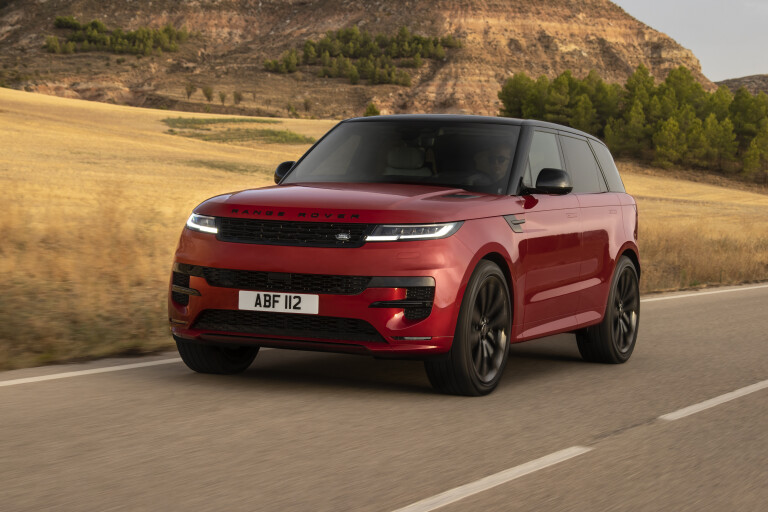
With a claimed 0-100km/h time of 5.4 seconds, the P510e isn’t going to worry a P530 the lights, but, again, in real-world driving it doesn’t feel that much slower than the V8, the 105kW e-motor adroitly delivering meaty dollops of instant-on torque, particularly in the mid-range. Regardless of mode or driving style it’s impossible to pick the transitions between the ICE and the e-motor, so smoothly are they accomplished.
What makes the P510e appealing is its ability to deliver near-V8 performance or better than six-cylinder fuel economy, depending on your mood.
We saw an average of 5.6L/100km indicated on the trip computer during gentle highway cruising in Comfort mode, the hybrid system shutting down the ICE very opportunity. That went to 13.9L/100 after a flat-out flog on the quiet country roads outside Madrid, with the transmission in Sport and manual shift modes, and the chassis in Dynamic drive mode.
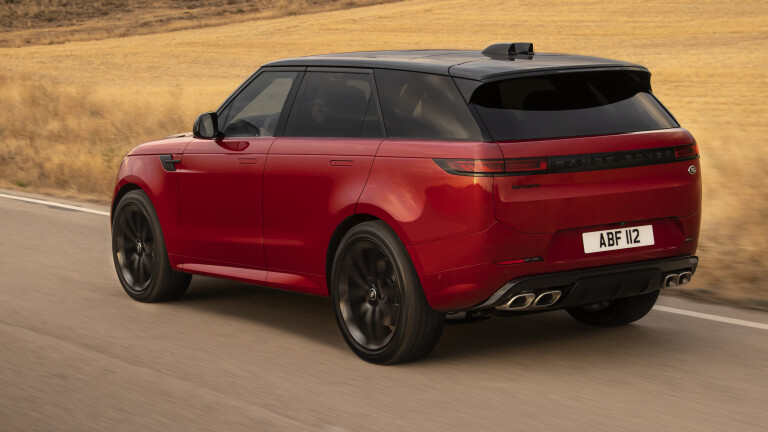
Beyond that, of course, the Sport P510e will waft around town on silent, smooth electric power, and if your daily commute is 80km or less, you may never use any petrol.
Previous generations of the Sport have successfully combined core Range Rover competencies – off-road capability and on-road ride comfort – with a more driver-focused approach to agility and handing, and this new model follows in their wheel tracks.
Land Rover’s legion of clever electronic aids turn challenging off-road problems into simple exercises where, with a modicum of care, the biggest concern is keeping expensive paint and pristine alloy wheels away from rocks and other sharp objects. The Range Rover Sport won’t defy the laws of physics off-road, but it will effortlessly go over terrain that 99.99 percent of owners would never dream of tackling.
It won’t defy the laws of physics on road, either. Though the electronics work hard to persuade you otherwise, there’s no escaping the fact the Sport is still big, tall, and heavy, weighing from 2385kg to 2810kg, depending on powertrain and spec, which is a lot of mass to hustle through the twisties.
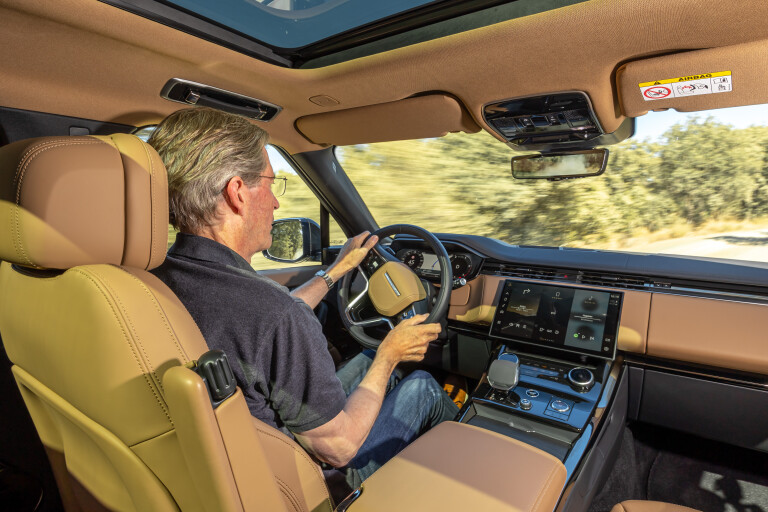
That said, the rear-steer system is an excellent addition to the Sport’s dynamic armoury, delivering a noticeable improvement in turn-in response into sharp corners. It's also very handy for manoeuvring around tight parking lots.
As you’d expect of a Range Rover, the primary ride quality is excellent, the height adjustable air suspension brilliantly calming body toàn thân motions, both in the vertical axis, and across the axles. Other than its bigger sibling, there’s no more comfortable SUV in the business.
Land Rover was keen to show off the 23-inch wheel and tyre package available on the new Sport. Designers love big wheels – they make cars look smaller, sportier, more tightly rendered – but engineers hate them. They’re heavy, which means more unsprung mass to manage, and the low-profile tyres wrapped around them have uncompromisingly stiff sidewalls.
Stiff sidewalls are fine on a Lambo, but the Range Rover Sport’s suspension sometimes struggled to resolve the disconnect between the impact harshness from the 285/40 tyres and the plushness of the primary ride on some of the less well surfaced Spanish roads, particularly the rear axle.
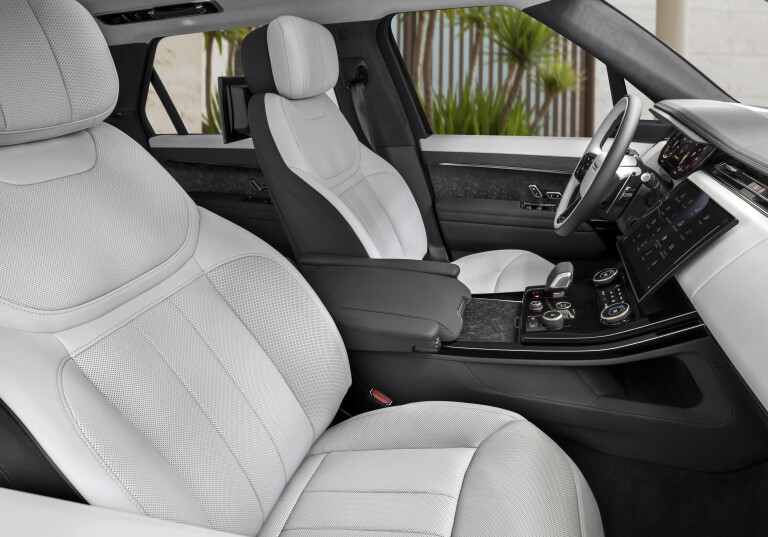
Land Rover engineers later confided the new Sport’s chassis has been optimised around the 22-inch wheel and tyre combination that’s standard on the Autobiography. The 22s, or the 21s that are standard on lesser trims, are probably the better choice for optimal comfort.
The one area where the new Sport has gone backwards compared with the previous model is the steering. Independently suspended Rangies have traditionally boasted light and accurate steering, with decent feel. The new Sport’s steering is very heavily weighted on centre, so much so that if you release your hands from the wheel with any lock on, it immediately springs back to centre.
Of course, no-one does that in normal driving. But what you will notice, particularly out on open roads, is the higher effort required to pull the wheel off-centre on the entry to corners, and that holding a consistent line through a sweeper is more difficult, as you’re constantly fighting the steering system’s urge to snap back to the straight ahead.
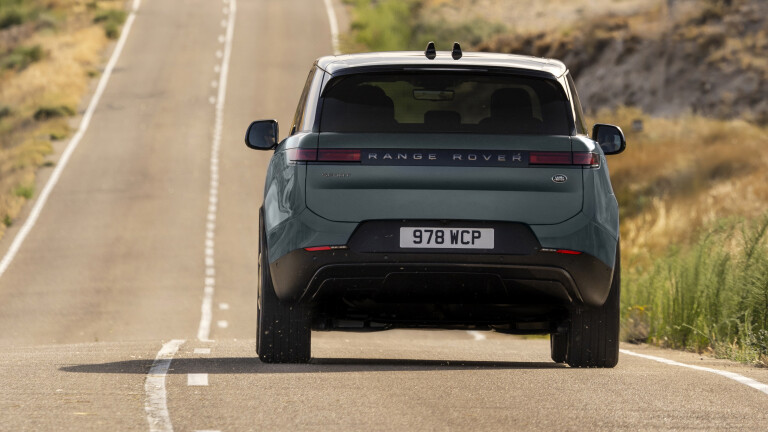
All the consistency, all the finesse, of the previous generation Sport’s steering has been carpet bombed out of existence. Why? To make the Range Rover Sport’s steering feel, er… sportier than the full-size Rangie, say Land Rover engineers. It doesn’t. It feels leaden.
There’s a lot to like about the new Range Rover Sport. It looks impressively chic and sophisticated, boasts some clever, state-of-the-art chassis and driver assistance technologies, and will go pretty much anywhere with casual aplomb. There’s more room inside than before, and it’s almost as smooth and quiet to ride in as the full-sized Range Rover.
But the steering tune is a red flag. The Range Rover Sport doesn’t need to feel any sportier. It needs to feel like a Range Rover.
8.5
Safety, value and features
Things we like
- Sophisticated designQuiet cabin and comfortable primary rideStill a benchmark in
terms of combined on- and off-road capability
Not so much
- Heavy on-centre steering feelV8 seems lazyImpact harshness from 23-inch wheel/tyre combo
COMMENTS
What is the difference between 2022 and 2023 Range Rover?
In comparison to the 2022 Range Rover Sport, the flagship 2023 Range Rover is more expensive and more generously equipped. The Range Rover can also be optioned with an extended wheelbase that the Range Rover Sport lacks.Will the 2023 Range Rover Sport be redesigned?
The third-generation 2023 Range Rover Sport just arrived in Los Angeles in May 2022, and it features a fresh new redesign with a wide variety of exciting features! The Range Rover Sport is the best-selling model from Land Rover in the United States, and is a smaller and sleeker variant of the classic Range Rover.Will the Range Rover change in 2023?
A longer wheelbase last enables a three-row model and paves the way for a plug-in hybrid with meaningful range as well as a full battery-electric version.What will the 2023 Range Rover Sport cost?
The 2023 Range Rover Sport luxury SUV is sleeker, more luxurious, more powerful, and even greener than it has ever been before. It has a starting price of $83,000. At the top of the lineup, the First Edition trim rings in $121,500. Tải thêm tài liệu liên quan đến nội dung bài viết New Range Rover Sport 2023 review UK programming 2023
Post a Comment